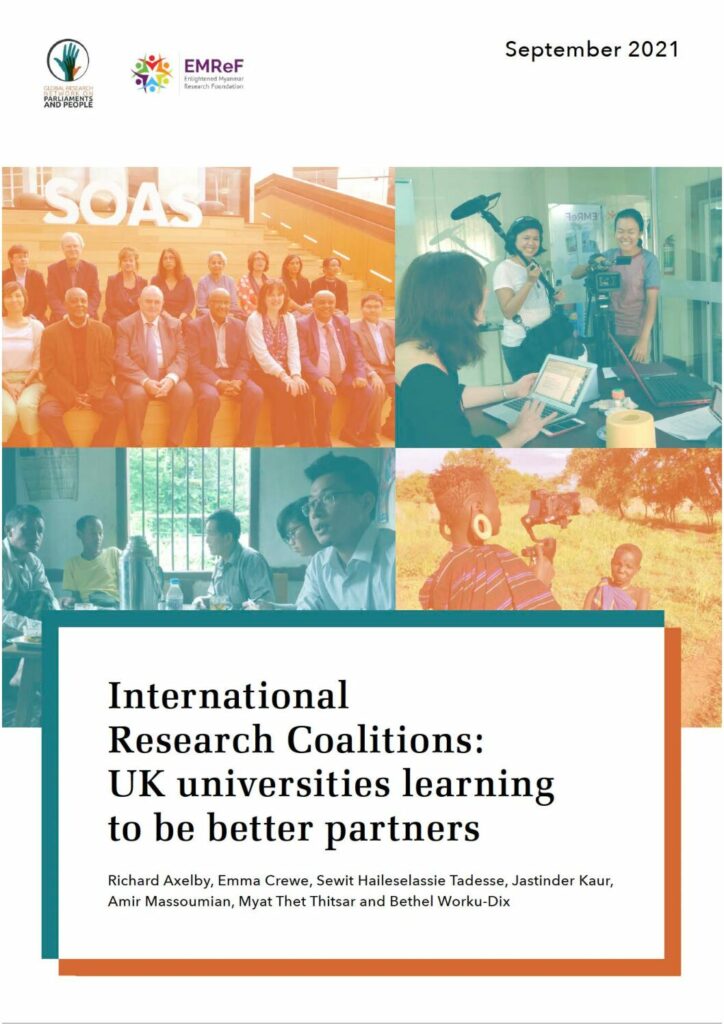Challenging harmful partnership practices

Global coalitions tend to be constrained by hierarchies of knowledge and harmful partnership practices. I wrote about how this plays out between international NGOs and national/local NGOs in Whose Development? (1998), with co-author Elizabeth Harrison, and some years later about some strategies for challenging these inequalities in an article called Doing Development Differently (2014). At a small INGO working on child rights we questioned our assumptions about where expertise lies. We once claimed that we were experts in child protection but that expertise is more profound in the national NGOs working with children in the countries in the Global South where we worked – social workers, community workers, counsellors and so on. In the domain of raising money, and brokering changes to plans and budgets, we UK-based development workers were the experts.
Once we had our map of expert knowledge a bit clearer, we improved our partnership practice. At this INGO, unusually, my colleagues were already 10 times more respectful than most development workers due to an ethos of anti-racism. But we refine our ways of working in partnership – e.g., co-developing each partnership agreement in tailored processes so that we wrote half and our partners in African, Asia and Latin American countries wrote the other half; ensuring we in the UK were evaluated as fiercely as our partners; always keeping partners in the loop about communications with donors and other opportunities for funding; visiting at a time convenient to them; and obsessing about timely financial transfers. More fundamentally, we changed our strategy so that our goals were about being better partners to national in the Global South, while their goals were about participatory work with children that reduced violence and improved wellbeing. We did not design the goals about children and then impose them on partners – we assumed they were in charge of working out with children and their carers/teachers what they needed, wanted and might aspire towards.
Since 2014 I have been working with research organisations in Bangladesh, Ethiopia and Myanmar from SOAS, University of London, trying to address the question – how can UK universities be better partners? With Ruth Fox, Director of the Hansard Society, we formed a coalition of scholars who researched the relationship between parliaments, MPs and those in society. We brought anthropologists together with policy, public administration and political science scholars in Bangladesh and Ethiopia and guided them to do their own research. But we were uncomfortable about the extent of our influence on designing the various projects. So in 2017 we teamed up with other universities in the UK and research organisations in Ethiopia and Myanmar and created a grant-making programme – Deepening Democracy – with a £2m grant from the Arts and Humanities Research Programe and the Global Challenges Research Fund. The point was to create an opportunity for scholars in two countries to design their own projects. Over 4 years we gave 50 grants to scholars in Bangladesh, Ethiopia, Myanmar and the UK and in the intensely competitive process we created, 46/50 were won by lead scholars in the Global South, 2 by diaspora, and 2 by white Europeans. The results – films, books, policy briefs – are outstanding, described on grantee pages of our website (under the umbrella of the Global Research Network on Parliaments and People) and accessible via our resources library.
How did this happen? Mainly because if you give funding to scholars in the Global South and tell them they have full control, the incentive to create amazing work is incredibly high. Their reputation is at stake. To a lesser extent, the success is partly because SOAS and our partners in Myanmar and Ethiopia worked unbelievably hard at trying to be good partners to each to other and the grantees, offering tailored support in response to requests (whether about finance, publishing or ethics). Those involved in running the programme have written a learning-from-practice paper about partnership, addressing the question about how to be good partners. You can find the paper in our outputs library or by clicking on the cover image above. The primary audience for this report is academics and professional staff working at UK universities and who are involved with planning or managing large international research collaborations. It could also be of interest to policymakers, grant-makers and governments when making decisions about where to invest resources, how to commission research, and how best to support research capacity development around the world. If anyone claims that Global South scholars lack capacity or respectful global partnerships are impossible, please refer them to our website and this paper on partnership.